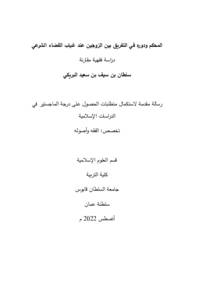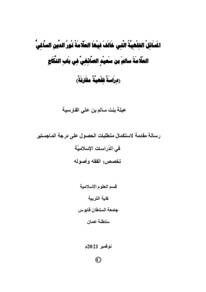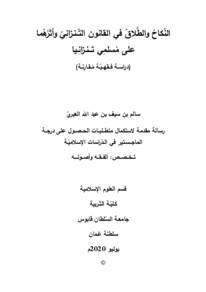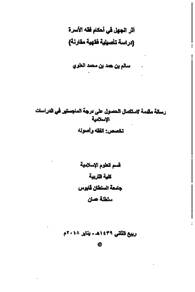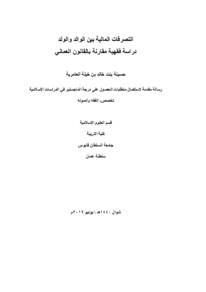Document
قانون الأحوال الشخصية في سلطنة عمان : (المادة رقم 1 و حتى المادة رقم 35) : دراسة فقهية و نقدية مقارنة.
Publisher
جامعة السلطان قابوس
Gregorian
2015
Language
Arabic
English abstract
This study came to root the articles of personal status laws in Oman in a fundamentally jurisprudent manner. This means these articles need to be referred to the sayings of jurisprudents from Ibadi sect and some other Islamic sects, and commenting on each article. The comment includes studying the source of the article and its importance, and have a sense of reality in each of them along with comparing with other personal status laws in some Arabic countries. This is to promote critical perception for these articles which contributes to review them, and provide feedback for development and keep pace with the dynamic rapid change.
The research contains an introduction that explains the meaning of the law and standardization along with the definition of the personal status, the benefits of this standardization, and its importance nowadays. The research also includes an introduction with the definition of the personal status law in Oman, its history, on what basis it is issued, its content and resources, and its aims and distinguishes.
Then the study talks about the jurisprudence rooting of article (1) up to article (35) detailed in three chapters. The researcher comes up with some findings as:
1- The Codification of Islamic rulings becomes of great necessity in this era where there are not many jurists. This is to avoid the differences in Islamic rulings as well as the dispute of desires. Instead, there should be a major concern for the public interests, and all of that help the individuals in the society to easily refer to these rules and make them aware of their rights and obligations. 2- The source of the personal status in Sultanate of Oman is Islamic jurisprudence in general and the Ibadis jurisprudence in particular. 3. The origin of this rule is (Muscat document for system – The united law of personal status in the Cooperation Council for the Arab States of the Gulf) 4- One of the aims of this law is to have stability in the Islamic rulings and make them closer to the sense of justice among the opponents and dismiss accusation against the judge. 5- The Omani lawmaker chooses the most applicable opinions, and the most approachable ones for people's circumstances with taking into account contemporary jurisprudence. 6- The law shows a high tolerance with other sects in the country although it relies mainly on the Ibadi jurisprudence in most of its articles. It gives those who belongs to the other sects the freedom to resort to the items of the law or to resort to the preponderant opinions of the other sects in some of the legal articles. This can be seen clearly in some issue of annulment of marriage. Certainly, the personal status has a strong relationship with the life and religion of an individual. 7- This law is flexible since it allows the judge over these articles to devote effort and study whatever needs consideration as in the issue of alimony and the estimation the gesture of appreciation. It also gives space for the tradition to be considered and allows the lawmaker to refer to and depend on it in the dissolution of marriage as in the conflicts between wife and husband when it comes to the receiving the dowry. 8- The law takes also into consideration those with who are non Muslims. It allows them to use their own rules in terms of personal status unless they themselves want to use the Omani law as in article (282). This is what I have mentioned previously that the personal status are related to person's religious and believes, and this also tells about the tolerance of Muslim Omani Society
9- The law is to be applied even if it contradicts with Fatwa or the authentic saying in the Ibadis sect. The article of the law needs to be continuously reviewed and assessed by the specialized scholars in order to avoid any gaps, and to add the related updated stuff. I have come up with some suggestions for modifying some articles. I have also designed a table so the specialist may refer to it whenever needed.
Arabic abstract
تأتي هذه الدراسة لتؤصل مواد قانون الأحوال الشخصية في سلطنة عمان تأصيلا فقهيا، بمعنى أنها تردها إلى الأدلة الشرعية من القرآن الكريم والسنة المطهرة وباقي الأدلة الأصولية، ثم ذكر أقوال الفقهاء من المذهب الإباضي وبعض المذاهب الإسلامية الأخرى، بالإضافة إلى التعليق على كل مادة، ويشمل هذا التعليق بيان مصدر المادة وأهميتها، والنظر إليها بعين الواقع، ومقارنتها بمثيلاتها في قوانين الأحوال الشخصية في بعض الدول العربية، من أجل تقديم رؤية نقدية لهذه المواد، تسهم في مراجعة هذه القوانين ومدها بالتغذية الناجعة من أجل تطويرها وتجديدها لتساير الواقع وتواكب العصر، وتخرج بها من أطر الجمود والثبات إلى آفاق النمو والارتقاء وقد احتوى هذا البحث على فصل تمهيدي تضمن تعريفأ لمعنى القانون والتقنين، وتعريفا بمصطلح الأحوال الشخصية وفوائد تقنينها، ومدى أهمية ذلك في العصر الراهن، كما اشتمل البحث على تعريف بقانون الأحوال الشخصية في سلطنة عمان، وتاريخه وأسباب صدوره ومحتواه ومصادره وأهدافه وخصائصه ثم تناول بالدراسة والتأصيل الفقهي بعض مواد القانون من المادة (1) حتى المادة رقم (۳۰) في ثلاثة فصول، وقد خلص إلى بعض النتائج، ومنها:
1- أن تقنين الأحكام الشرعية في هذا العصر الذي قال فيه المجتهدون أصبح ضرورة ملحة؛ لتفادي اختلاف الأحكام وتنازع الأهواء، أخذا بالمصالح المرسلة، وتيسيرا على أفراد المجتمع الرجوع إليها لمعرفة حقوقهم وواجباتهم. ۲- إن مصادر قانون الأحوال الشخصية في سلطنة عمان هي الفقه الإباضي، ولم يغفل سائر المذاهب الإسلامية الأخرى.
٣- إن أصل هذا القانون هو ( وثيقة مسقط للنظام - القانون - الموحد للأحوال الشخصية الدول مجلس التعاون لدول الخليج العربية ). 4- إن من أهداف القانون استقرار الأحكام، وجعلها أقرب إلى تحقيق العدالة بين المتخاصمين، ورفع التهمة عن القاضي. ه- أن المقتن العماني اختار أيسر الأقوال وأوفقها لأحوال الناس مراعاة لفقه الواقع.
- أبدى القانون تسامحا مع المذاهب الأخرى في البلاد رغم اعتماده على الفقه الإباضي في أكثر مواده، فأتاح للمنتمين للمذاهب الأخرى حرية الاختيار بين التحاكم إلى مواد القانون أو التحاكم إلى الراجح من آراء مذاهبهم الفقهية، وذلك في بعض المواد القانونية، كما في بعض قضايا الفرقة بين الزوجين؛ لأن الأحوال الشخصية لها ارتباط وثيق بحياة الإنسان ودينه. ۷- أن هذا القانون يتسم بالمرونة، حيث ترك القاضي في كثير من مواده الاجتهاد والنظر فيما يمكن النظر فيه، كما في مسألة النفقات وتقدير المتعة، وكذلك أعطى مجالا للغرف، فقد أجاز المقنن الرجوع إليه واعتماده في فصل الخلاف، كما هو الأمر بالنسبة للخلاف بين الزوجين في قبض حالة الصداق. . ۸- أن القانون راعي أيضا أتباع الشرائع الأخرى غير المسلمين، فأجاز لهم تطبيق الأحكام الخاصة بهم في مسائل الأحوال الشخصية، إلا إذا طلبوا بأنفسهم تطبيق نصوص القانون العماني كما في المادة (۲۸۲) ، وهذا كما ذكرت آنفا من أن الأحوال الشخصية مرتبطة بدين الإنسان ومعتقده ، وفي هذا ما يدل على تسامح المجتمع العماني المسلم ۹- يتم تطبيق القانون ولو خالف الفتوى أو القول المعمول به في المذهب الإباضي. ۱۰- أن مواد القانون بحاجة إلى مراجعة وتقييم مستمر من قبل العلماء والمختصين؛ لتلافي النقص ولتضاف إليه المستجدات، وقد قمت باقتراح تعديلات على بعض المواد التي على ظني الفقهي أنها الأنسب للمواد القانونية والأوفق بمقاصدها، أفردت لها جدولا خاصا ليسهل للمختصين الرجوع إليها.
1- أن تقنين الأحكام الشرعية في هذا العصر الذي قال فيه المجتهدون أصبح ضرورة ملحة؛ لتفادي اختلاف الأحكام وتنازع الأهواء، أخذا بالمصالح المرسلة، وتيسيرا على أفراد المجتمع الرجوع إليها لمعرفة حقوقهم وواجباتهم. ۲- إن مصادر قانون الأحوال الشخصية في سلطنة عمان هي الفقه الإباضي، ولم يغفل سائر المذاهب الإسلامية الأخرى.
٣- إن أصل هذا القانون هو ( وثيقة مسقط للنظام - القانون - الموحد للأحوال الشخصية الدول مجلس التعاون لدول الخليج العربية ). 4- إن من أهداف القانون استقرار الأحكام، وجعلها أقرب إلى تحقيق العدالة بين المتخاصمين، ورفع التهمة عن القاضي. ه- أن المقتن العماني اختار أيسر الأقوال وأوفقها لأحوال الناس مراعاة لفقه الواقع.
- أبدى القانون تسامحا مع المذاهب الأخرى في البلاد رغم اعتماده على الفقه الإباضي في أكثر مواده، فأتاح للمنتمين للمذاهب الأخرى حرية الاختيار بين التحاكم إلى مواد القانون أو التحاكم إلى الراجح من آراء مذاهبهم الفقهية، وذلك في بعض المواد القانونية، كما في بعض قضايا الفرقة بين الزوجين؛ لأن الأحوال الشخصية لها ارتباط وثيق بحياة الإنسان ودينه. ۷- أن هذا القانون يتسم بالمرونة، حيث ترك القاضي في كثير من مواده الاجتهاد والنظر فيما يمكن النظر فيه، كما في مسألة النفقات وتقدير المتعة، وكذلك أعطى مجالا للغرف، فقد أجاز المقنن الرجوع إليه واعتماده في فصل الخلاف، كما هو الأمر بالنسبة للخلاف بين الزوجين في قبض حالة الصداق. . ۸- أن القانون راعي أيضا أتباع الشرائع الأخرى غير المسلمين، فأجاز لهم تطبيق الأحكام الخاصة بهم في مسائل الأحوال الشخصية، إلا إذا طلبوا بأنفسهم تطبيق نصوص القانون العماني كما في المادة (۲۸۲) ، وهذا كما ذكرت آنفا من أن الأحوال الشخصية مرتبطة بدين الإنسان ومعتقده ، وفي هذا ما يدل على تسامح المجتمع العماني المسلم ۹- يتم تطبيق القانون ولو خالف الفتوى أو القول المعمول به في المذهب الإباضي. ۱۰- أن مواد القانون بحاجة إلى مراجعة وتقييم مستمر من قبل العلماء والمختصين؛ لتلافي النقص ولتضاف إليه المستجدات، وقد قمت باقتراح تعديلات على بعض المواد التي على ظني الفقهي أنها الأنسب للمواد القانونية والأوفق بمقاصدها، أفردت لها جدولا خاصا ليسهل للمختصين الرجوع إليها.
Member of
Resource URL
Same Subject
